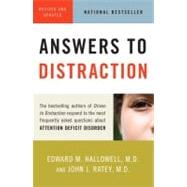The book that answers your questions about ADD—now revised and updated
After decades of being unfairly diagnosed, children and adults with attention deficit disorder are now recognized as having a common and treatable neurological condition. Drs. Hallowell and Ratey answer the questions most frequently asked at their nationwide workshops and seminars, resulting in an easy-to-read reference that covers every aspect of the disorder: from identifying symptoms and diagnosis, to the latest treatment options, as well as practical day-to-day advice on how you or a loved one can live a normal life with ADD.
Whether you are a patient, parent, teacher, or health-care professional, Answers to Distraction will help those whose ADD has caused persistent problems in school, at work, and in relationships.
Q&As include:
What is the single most important scientific finding about ADD in the last decade?
How early can ADD be diagnosed?
Where can a parent get support for dealing with a child who has ADD?
What advances in the field of medication have taken place since the original version of this book was published?
This companion book to "Driven to Distraction" provides practical solutions to the dilemmas of Attention Deficit Disorder or ADD. This user's guide to ADD is presented in question-and-answer format, ideal for even the most distractible reader.








